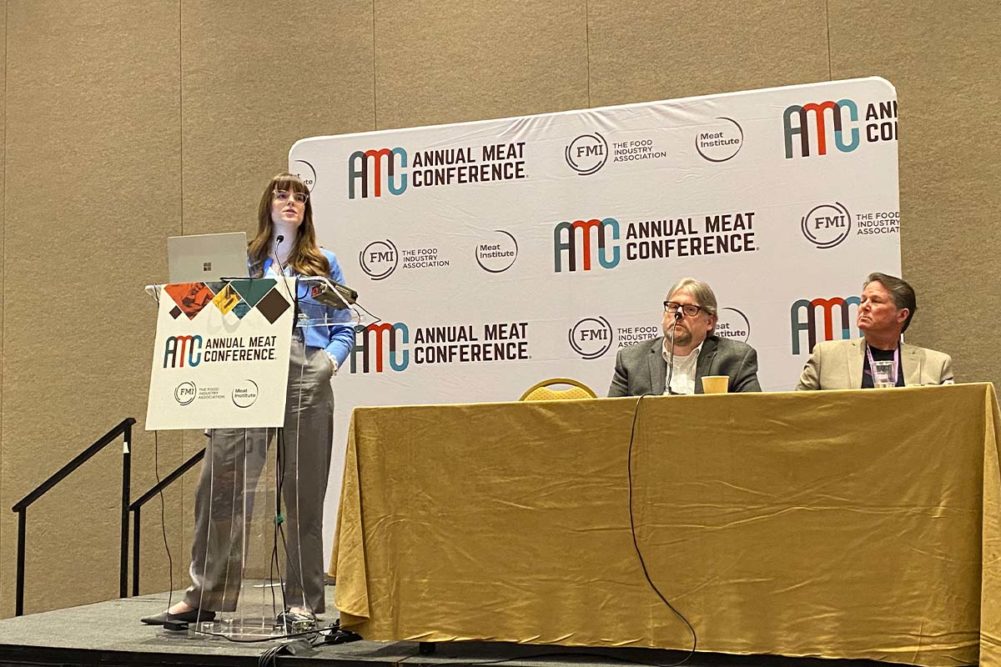NASHVILLE — During a panel discussion at the Annual Meat Conference on March 18, attendees heard multiple perspectives on some of the latest updates on the regulatory and policy matters affecting the meat industry.
Panelists included Casey Gallimore, director of regulatory policy at the Meat Institute, and Andrew Harig, vice president of tax, trade, sustainability and policy development for FMI – the Food Industry Association.
Gallimore began highlighted meat-specific legislation, including the implementation of California’s Proposition 12 and how it will be enforced throughout the year.
“We still have not seen California really actively enforcing,” Gallimore said of Prop 12. “They still are fairly in an educational mode.”
The next item during the panel was how the industry continues to await amended regulations after portions of Massachusetts’ Question 3 were struck down in February.
The court will now hear arguments in the next few months on whether Massachusetts has the authority to regulate meat plants instead of following the Federal Meat Inspection Act, which would preempt state law.
After reviewing the recent animal confinement updates, Gallimore also discussed the Meat Institute’s position on why these initiatives end up on the ballot.
“I think what’s interesting with Prop 12 and Question 3 is that, regardless of how you feel about gestation stalls, animal confinement procedures or any of those things, I always try to remind people that’s not really what this is about,” she said. “This is about an attack on animal agriculture. It’s an orchestrated attack by people who don’t want animal agriculture to exist.”
Gallimore also pointed to a new ballot initiative in Denver, Colo., that would prohibit the construction, maintenance or use of slaughterhouses within city limits.
Gallimore said Denver will be an interesting example because Colorado is a state rooted in animal agriculture, but there’s a growing population within Denver of many people who are not connected to animal agriculture. The ballot measure is set for the November election.
Gallimore moved on to some updates on the Food Safety Inspection Service, including how the agency is doing exploratory sampling of beef products that will be used for products labeled with Raised Without Antibiotics (RWA) claims.
She said the tests were done during the last quarter of 2023, and FSIS has yet to come out with the results.
Gallimore also gave an update on FSIS’ position on declaring Salmonella an adulterant in breaded and stuffed raw chicken products. She explained that the agency has used this poultry product as their “guinea pig” with other possible proteins being named in the future.
“Even if you are solely in the beef space or solely in pork space, you do not get to say you don’t care what happens to poultry,” Gallimore said. “Because what happens to poultry is a case point to what’s coming to you.”
Harig outlined how deadlocked the US Congress has been recently, making it difficult to pass the Farm Bill and other agriculture and meat legislation.
“Normally, the conventional wisdom is you can’t go into an election without completing the Farm Bill if you’re from a rural area,” Harig said. “I kind of think conventional wisdom is kind of out the window in recent months.”
Harig mentioned that the Ending Agricultural Trade Suppression (EATS) Act, which was proposed as an anti-Prop 12 bill in 2023, has not moved forward in its process to become law in the Senate.
With the potential of an administration change, Harig pointed out a big push on the regulatory side to get as much done before the election.
Near the end of his comments, Harig also remarked on the difficulties of new packaging solutions in meat and how companies will have to work with the supply chain to understand what’s technologically capable in the future.
Several of the session attendees followed up on some of the other regulatory topics mentioned, including the recent announcement of the final rules for the voluntary ‘Product of USA’ label claim for meat, poultry and eggs.



